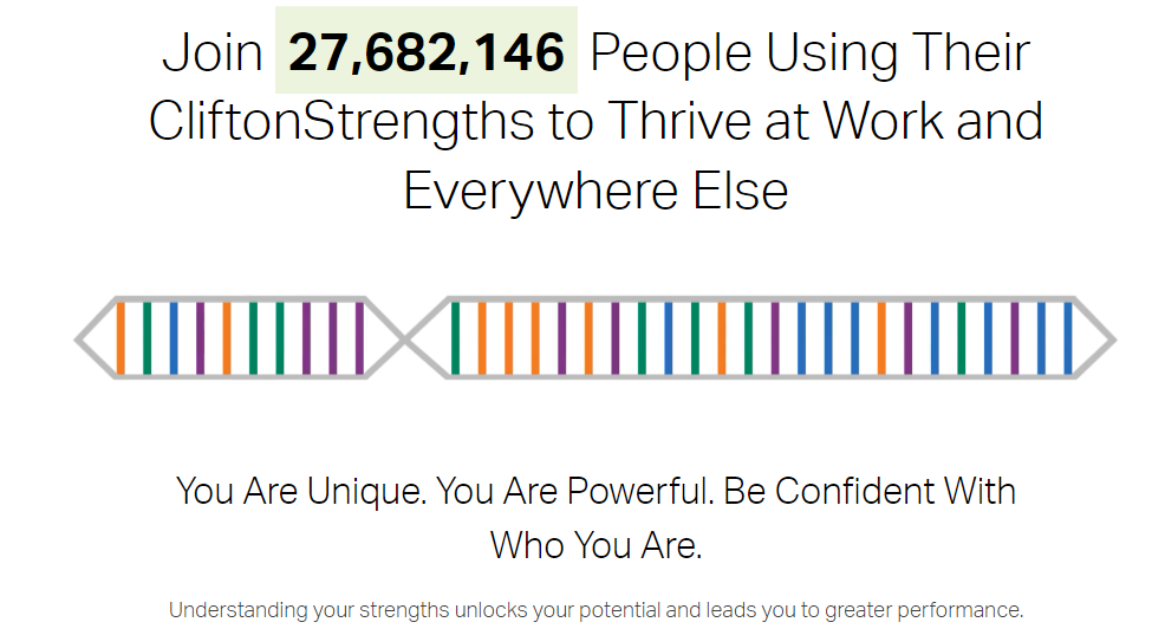
In my strengths coaching with clients, I often get asked: Should I retake the CliftonStrengths assessment if I’ve done it before?
Worldwide, over 27 million people have taken the assessment (as of June 2022, real-time data lovers can view the current numbers here). The number keeps rising, and, nearly 3% of New Zealand’s population has taken an assessment. I often wonder how many of these people are using their strengths every day or if it’s just a report sitting in a drawer somewhere?!
Before you need to consider if you need to retake the CliftonStrengths assessment I recommend reading more about the model via my blog here.

Did you know that there’s a 1 in 33 million chance of anyone else in the world sharing the same Top 5 strengths as you in the same order? That’s quite something. That’s how unique we all are. It’s important we get to know our own unique power and edge and that of others we share life with. When it comes to strengths, I’m often reminded of this Whakatauākī:
E koekoe te tūī, e ketekete te kākā, e kūkū te kereru.
The tūī squawks, the kākā chatters, the kereru coos. It takes all kinds of people.
Nature and birdsong can remind us of how different we all are and all have different ‘songs’ we sing to. As humans, celebrating these differences and uniquenesses in each other helps us appreciate each other and when we come together, combining our different strengths, we can make some wonderful harmony with all our different songs! Be inspired by nature and birdsong, it has a lot to teach us humans!
My mission is to ignite people’s potential so they can make more of a positive impact in their life and work.
So if that means you’ve got a profile sitting somewhere in a drawer already but aren’t aware of your strengths or using them every day then get in touch. I’ll help you unlock your strengths and your unique potential. But for those of us who are wondering, will I have grown as a person? Perhaps my results are now different. Should I retake the CliftonStrengths assessment?
What reasons should I retake the CliftonStrengths assessment?
There’s a lot of research about whether people’s CliftonStrengths change much over time. For many people, the answer is generally ‘no, not much’, but some circumstances may call for a retake, for example:
You took it right before or after a traumatic life event.
You took it in your non-native language.
You were distracted when you took it.
You initially took the assessment before the age of 25 (when neuroplasticity in the brain is more ‘elastic’)
You were not authentic in your responses the first time you completed the assessment.
I’ve worked with several clients who have chosen to retake the CliftonStrengths assessment, and often they are pretty surprised at how their profile had mostly stayed the same, even though they may be in a very different role when they first took the assessment. When I say ‘the same’, the order of their 34 talent themes may have shuffled around a bit. Still, their dominant talent themes (usually the Top 10) vs. supporting themes (usually 11-29) vs. lesser talent themes (usually 30-34) tend to sit in the same categories. For those who have been through significant life transitions, little ‘t’ and big ‘T’ trauma, or major career changes, some of these individuals have found perhaps one or two of their dominant talent themes have popped right down the list into a supporting theme.
So, you might find your strengths shift a bit over time if you’ve been through big life changes, but is it really worth spending money to retake the assessment again (it’s actually quite expensive to purchase online assessments), or save your pennies for getting some coaching to unlock your potential instead?!
When you choose to retake the CliftonStrengths assessment
Suppose a person has worked with their strengths since first taking an assessment (through coaching and building their self-awareness, appreciation, and application of their talent themes). In that case they are primed with this knowledge (even subconsciously!) when they retake the CliftonStrengths assessment a second time (i.e., there’s a risk of answer bias in their assessment as they already know what the 34 talent themes all mean). So our first assessment usually gets the ‘purest and most revealing result’. So, even if you felt rushed, or think you answered a few questions wrong the first time around, or took your assessment years ago, your current profile is still probably very valid. If you’re super interested in Gallup’s methodology for CliftonStrengths, you can download the Clifton StrengthsFinder 2.0 Technical Report via this website here.
The CliftonStrengths assessment asks 177 ‘paired statement’ questions that measure talents, i.e. your natural patterns of thinking, feeling, and behaving. The brain’s neuroplasticity apparently doesn’t change much after our mid-20ies, so our natural ways of thinking, feeling and behaving typically don’t change much throughout adulthood (that’s a scary thought for some!). But while that may be scientifically true, it doesn’t mean our ‘adult neuroplasticity’ can’t deepen and widen our existing strengths – you CAN teach an old dog new tricks, after all.

What you get when you do CliftonStrengths coaching with Antonia
For all my clients, as well as the CliftonStrengths profile itself, I also produce bespoke personalised Strengths Power Packs. These are full of valuable one-pagers visualising your strengths profile which you can read about here. Shout out to Richard Sterry and the Cascade tool which is the magic tool behind these packs. These Strengths Power Packs are a wonderful way to help you keep your strengths alive in your day-to-day as you can visualise your profile on your walls and desk using these one-pagers. These reports provide insight into particular areas, challenges and alignments you have in your own strengths profile.
If you’re part of a team, you can get a Team Grid and Team Summary visualising the whole team’s strengths combined (a great way to discover the ‘strengths DNA’ of a team, Unique Contributors, and exploring powerful partnerships within a group).
Ok, so maybe I don’t need to retake the CliftonStrengths assessment but what happened to my strengths profile over time?
A little story dialing back the clock to 2005. This is when I first took a CliftonStrengths assessment in 2005 as part of some leadership development training at work. Here, I received my Top 5 profile, not the full 34 one, and we had a one-hour group debrief on our profiles). It was one of those things I did that gave me ‘warm fuzzies’ when I did it, I felt validated and understood, but I didn’t do anything following on from that to apply my strengths or use my profile on an ongoing basis. I didn’t get coaching at the time. Big mistake (If I only knew then what I knew now about the power of coaching being life changing!)
When I retook the CliftonStrengths assessment again in 2018 when I became a Gallup Certified Strengths Coach, this is when it all came to life for me. I got formal coaching as part of my certification and dived deep into all 34 of the talent themes to understand what they all mean.
I found that one of my dominant talent themes (Woo) that was previously in my Top 5 of my profile had dropped right down into the ‘supporting themes’ list (it’s now #16). Between 2005-2018, I’d moved countries, got married, become a parent of two children, and there had been quite a few career development changes I’d gone through.
Woo stands for ‘winning others over’ – people with Woo derive satisfaction from meeting new people, breaking the ice, and making connections with a wide variety of people. I often describe it as a talent theme that can influence connections with a broad range of people (whereas Relator, in contrast, is great at building depth and authenticity in relationships one-on-one). I’ve noticed that since I became a parent, I’ve become way more introverted. I’m no longer the ‘social butterfly’ that Antonia once used to be – the idea of meeting more people kinda exhausts me now. I have difficulty keeping up with all the connections I already have! So this explains (to me) why my Woo is now a supporting talent theme, and no longer dominant in my profile. It’s not a talent theme that I think is worth me investing in (but I can ‘put it on’ from time to time when required).
Growth and change happen to us all, so if you want to look at your past and present we can review where your strengths have changed over time.
So just remember, while it isn’t often necessary to retake the CliftonStrengths assessment, if you’ve done so, it’s a useful exercise to ask yourself one simple question. If your strengths profile has changed over time what would YOU put the changes down to?
